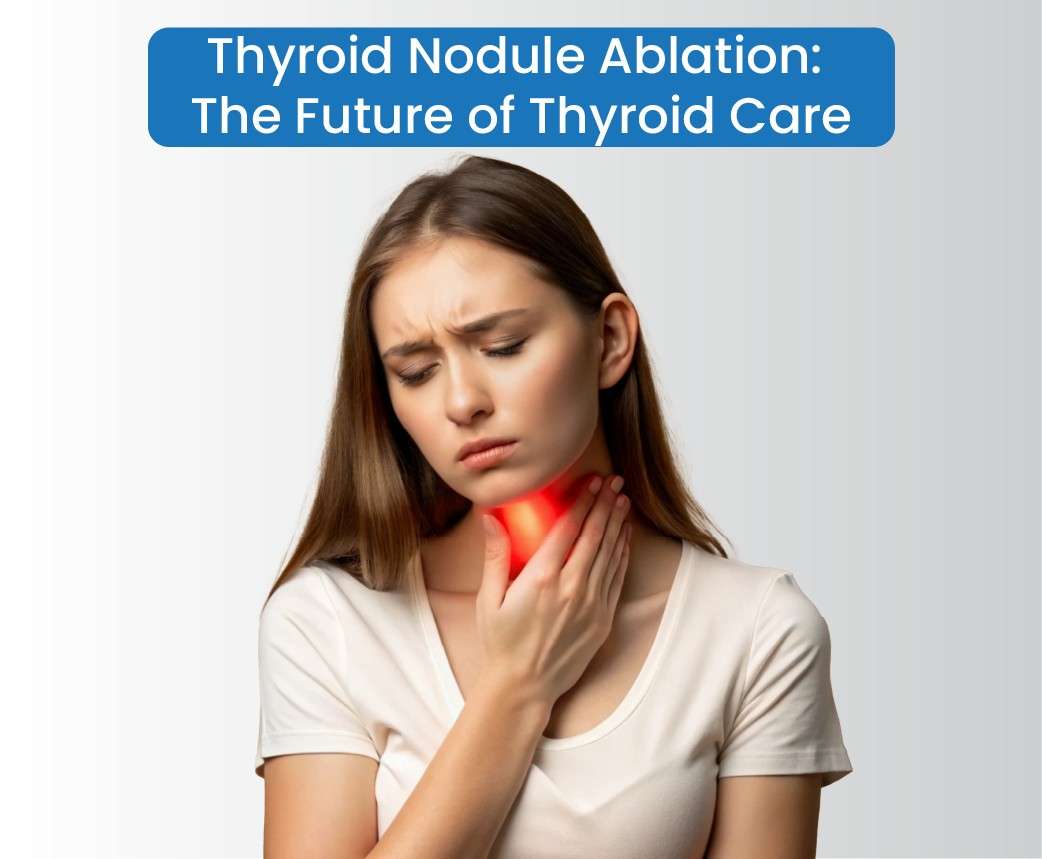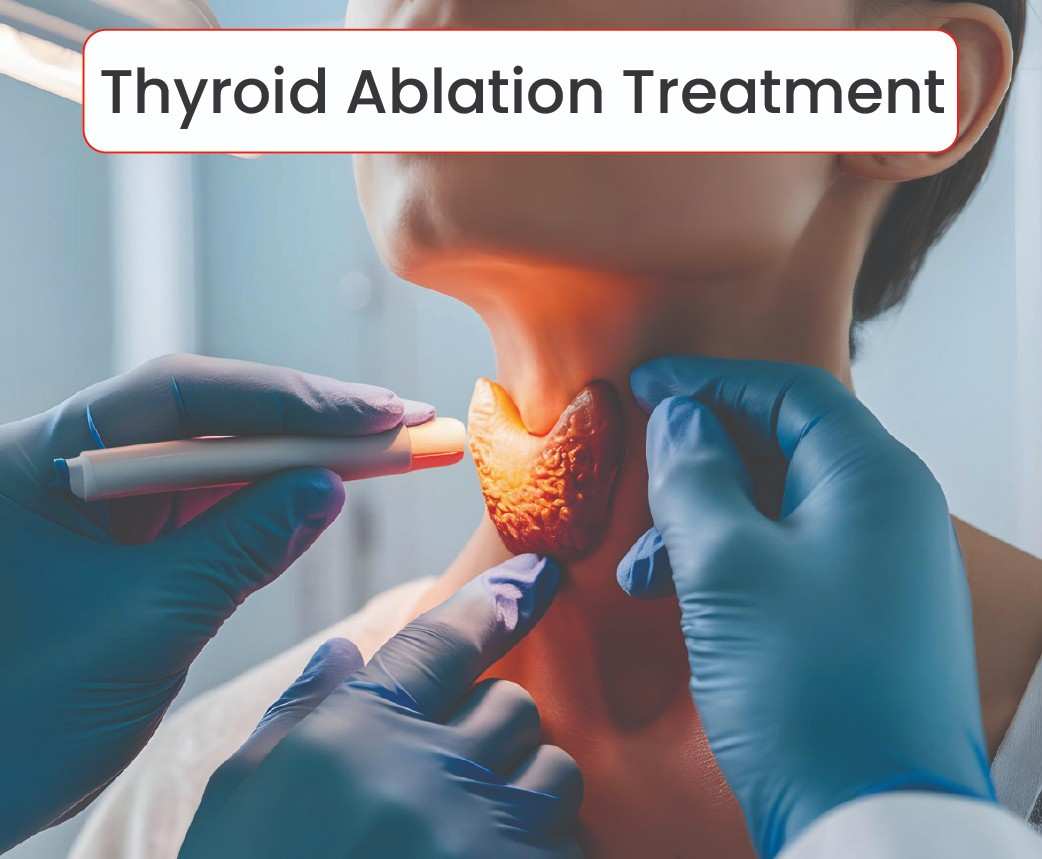Thyroid Ablation Treatment
Thyroid ablation, also known as radiofrequency ablation (RFA) or ethanol ablation, is an advanced, minimally invasive procedure to treat benign thyroid nodules and, in some cases, small, localized thyroid cancers. The growing popularity of thyroid ablation is driven by the need for a safer, effective alternative to traditional thyroid surgery. With an increasing number of people affected by thyroid issues worldwide, thyroid ablation has emerged as an essential treatment in managing these conditions while minimizing risks.
Why Thyroid Ablation is Necessary Today
Thyroid nodules are common, affecting up to 60% of adults, and most are benign. However, they can sometimes cause symptoms due to their size or location, such as difficulty swallowing, a persistent cough, or cosmetic concerns. Traditional thyroid surgery, which involves removing part or all of the thyroid gland, comes with potential complications, including scarring, risk of nerve damage, and lifelong dependence on thyroid hormone replacement if a significant portion of the thyroid is removed. Given these factors, thyroid ablation offers a non-surgical alternative that reduces risks and shortens recovery time, making it particularly relevant today as patients seek safer, less invasive treatments.
Additionally, there is a growing awareness of the risks of overtreatment for small, low-risk thyroid cancers. Many patients and physicians are opting for thyroid ablation to manage these cases, as it avoids the need for full thyroid removal and allows patients to maintain normal thyroid function.
How Thyroid Ablation Works
In a thyroid ablation procedure, a doctor uses ultrasound guidance to insert a small needle into the thyroid nodule. Energy (either heat from radiofrequency waves or ethanol) is delivered through the needle to target and destroy the nodule’s tissue. This precise technique allows for effective treatment with minimal impact on surrounding tissues. The dead tissue is gradually absorbed by the body, causing the nodule to shrink over time.
The procedure is typically performed under local anesthesia and takes about 30 to 60 minutes, depending on the nodule size. Patients can usually resume normal activities within a day or two, and there is no scarring, making it a particularly attractive option for individuals concerned with aesthetics.
Benefits of Thyroid Ablation for Patients
Thyroid ablation offers numerous advantages over traditional surgery, making it a highly beneficial treatment option for patients with benign or low-risk thyroid nodules:
- Minimally Invasive with Minimal Downtime
Since it doesn’t involve large incisions, thyroid ablation allows patients to return to normal activities much sooner than surgery. Most patients experience only mild discomfort, and recovery is swift, with many resuming work within a day. - Preserves Thyroid Function
Unlike surgery, which may remove part or all of the thyroid gland, ablation treats only the affected tissue. This means the thyroid can continue to function normally, reducing the need for lifelong thyroid hormone medication. - Effective Symptom Relief
For individuals experiencing symptoms from large or noticeable nodules, thyroid ablation can significantly reduce the size of the nodule, alleviating symptoms like difficulty swallowing, discomfort, or visible swelling in the neck. - Aesthetic Advantage
Because thyroid ablation doesn’t involve surgical incisions, there’s no visible scarring on the neck. This is particularly beneficial for patients who are concerned about the cosmetic impact of surgery. - Low Risk of Complications
Thyroid ablation has a lower risk of complications compared to surgery, including minimal risk of nerve damage to the vocal cords. This makes it a safer choice for patients, particularly older adults or those with health conditions that increase surgical risks.
Why Thyroid Ablation Matters Now
The rising incidence of thyroid issues, combined with a preference for less invasive treatments, makes thyroid ablation an essential option in the field of endocrinology today. As patients increasingly seek treatments that offer safety, quick recovery, and effective results, thyroid ablation provides a perfect balance. It is especially valuable for those with benign thyroid nodules or low-risk thyroid cancers, allowing for effective treatment without compromising thyroid function or quality of life.
In conclusion, thyroid ablation is an advanced, patient-friendly treatment that aligns well with modern healthcare’s goals: minimal invasiveness, maximum efficacy, and high patient satisfaction. For those dealing with thyroid nodules, ablation represents a promising path to relief and recovery without the challenges of traditional surgery.
Thyroid ablation is done by our expert doctors at Avis Vascular Center. Call today, and talk to our doctors for more clarity on the procedure.
Shifting Paradigms in Thyroid Treatment
The landscape of thyroid treatment has undergone a remarkable transformation in recent years, marked by a discernible shift away from traditional surgical interventions towards minimally invasive procedures. Among these advancements, radiofrequency ablation (RFA) has emerged as a promising alternative for addressing thyroid nodules and small thyroid cancers. In this comprehensive exploration, we explain the rationale behind this transition, the intricacies of radiofrequency ablation, and the array of benefits it offers to patients.
Understanding the Evolution
For decades, surgical removal of the thyroid gland, known as thyroidectomy, stood as the cornerstone of treatment for various thyroid disorders, including nodules and cancers. While effective, thyroidectomy entails inherent risks, including damage to adjacent structures, postoperative complications, and the need for lifelong thyroid hormone replacement therapy. As a result, healthcare providers have increasingly sought less invasive alternatives that prioritize patient safety, minimize morbidity, and optimize outcomes.
Radiofrequency Ablation: A Minimally Invasive Marvel
Radiofrequency ablation represents a significant breakthrough in the realm of thyroid care, offering a targeted, non-surgical approach to managing thyroid nodules and select thyroid cancers. The procedure involves the precise delivery of thermal energy to the targeted tissue, achieved through the insertion of a specialized needle guided by ultrasound imaging. This energy heats and destroys the abnormal thyroid tissue while sparing the surrounding healthy tissue, thereby preserving thyroid function and minimizing the risk of complications.
Unveiling the Benefits
The adoption of radiofrequency ablation as a preferred treatment modality is underscored by a myriad of advantages that it confers upon patients:
- Preservation of Thyroid Function: Unlike thyroidectomy, which often necessitates the removal of a portion or the entirety of the thyroid gland, RFA selectively ablates the pathological tissue while preserving the functional integrity of the thyroid. This preservation of thyroid function mitigates the risk of hypothyroidism and obviates the need for lifelong hormone replacement therapy.
- Minimized Morbidity and Complications: By virtue of its minimally invasive nature, RFA mitigates the risk of surgical complications such as wound infection, bleeding, and injury to surrounding structures like the recurrent laryngeal nerve and parathyroid glands. This translates into reduced postoperative pain, shorter hospital stays, and expedited recovery times for patients.
- Enhanced Cosmetic Outcomes: The small incisions required for RFA result in minimal scarring and cosmetic disfigurement compared to the more extensive incisions associated with thyroidectomy. This aesthetic advantage is particularly relevant for patients who prioritize cosmetic outcomes and wish to minimize visible surgical scars.
- Outpatient Procedure: Radiofrequency ablation is typically performed on an outpatient basis, allowing patients to return home on the same day of the procedure. This eliminates the need for hospitalization and reduces healthcare costs associated with prolonged hospital stays, making RFA an economically viable treatment option.
- High Efficacy and Safety Profile: Extensive clinical research has demonstrated the efficacy and safety of RFA in reducing the size of benign thyroid nodules and achieving complete remission of select thyroid cancers. The procedure boasts high success rates, with minimal risk of recurrence or adverse effects.
Embracing a Paradigm Shift
The integration of radiofrequency ablation into the thyroid treatment modalities represents a paradigm shift in the approach to thyroid care. With its ability to provide effective, minimally invasive solutions for thyroid nodules, RFA empowers patients and healthcare providers alike to navigate the complexities of thyroid disease with confidence and optimism.
As the field of thyroidology continues to evolve, driven by innovation and technological advancements, the prominence of minimally invasive approaches like RFA is poised to expand. By embracing these transformative modalities, healthcare providers can usher in a new era of thyroid care characterized by improved patient outcomes, enhanced quality of life, and a renewed commitment to patient-centered care.
Thyroid Ablation for Women’s Health
Thyroid disorders are a significant health concern, especially among women, affecting their quality of life, metabolism, and overall health. Traditional treatments have ranged from medication to surgery, depending on the severity and type of thyroid disorder. However, in recent years, thyroid ablation has emerged as a groundbreaking technique, offering a non-surgical alternative that has proven particularly beneficial for women. This blog explores the ablation technique used for thyroid disorders, focusing on its efficacy for women.
Understanding Thyroid Ablation
Thyroid ablation, primarily involving radiofrequency ablation (RFA) and ethanol ablation (EA), is a minimally invasive procedure designed to reduce the size of thyroid nodules and manage hyperthyroidism symptoms. RFA uses heat generated by radio waves to destroy thyroid nodule tissue, while EA involves injecting ethanol directly into the thyroid nodules to induce shrinkage. These techniques are highly targeted, affecting only the abnormal thyroid tissue, thereby preserving the surrounding healthy tissue and maintaining thyroid function.
Why Ablation is Particularly Beneficial for Women
Women are disproportionately affected by thyroid disorders, with conditions like goiter, thyroid nodules, and autoimmune thyroid diseases being more common in females. The advantages of thyroid ablation for women are manifold:
- Preservation of Thyroid Function: Many women with thyroid nodules or mild hyperthyroidism wish to avoid surgery due to the risk of damaging the thyroid gland and necessitating lifelong hormone replacement therapy. Thyroid ablation offers a precision-targeted approach that minimizes the risk of harming overall thyroid function.
- Cosmetic Benefits: For women, the cosmetic impact of thyroid surgery scars can be a significant concern. Ablation requires only a small puncture or incision, significantly reducing scarring and preserving the neck’s appearance.
- Reduced Recovery Time: As a minimally invasive procedure, ablation allows for a quicker recovery compared to surgery. Women can return to their daily routines and responsibilities sooner, which is particularly advantageous for those balancing careers and family care.
- Lower Risk of Complications: Ablation carries a lower risk of complications compared to surgical interventions. This aspect is crucial for women, especially those with underlying health conditions or those concerned about the risks associated with general anesthesia.
- Effectiveness in Treating Functioning Nodules: For women suffering from autonomously functioning thyroid nodules, which can lead to hyperthyroidism, ablation offers an effective treatment that directly targets and mitigates the overactive nodule, often restoring normal thyroid function.
Who Can Benefit from Thyroid Ablation?
Thyroid ablation is particularly suitable for women who:
- Have benign thyroid nodules causing cosmetic concerns or compressive symptoms.
- Suffer from mild hyperthyroidism due to autonomously functioning thyroid nodules.
- Are not candidates for surgery due to medical reasons or personal preference.
- Wish to avoid lifelong thyroid hormone replacement therapy.
Thyroid ablation stands as a significant advancement in the treatment of thyroid disorders, offering a safer, less invasive, and effective alternative to traditional surgical methods. For women, who bear the brunt of thyroid diseases, this technique not only provides a therapeutic option that preserves thyroid function and appearance but also aligns with their lifestyle and health preferences. As we move forward, the role of thyroid ablation in managing thyroid disorders in women is poised to expand, bringing hope and improved quality of life to many.
Thyroid nodules, should you worry?
Thyroid nodules are lumps or growths within the thyroid gland, which is located at the base of the neck. While most thyroid nodules are benign (non-cancerous), they can sometimes lead to complications, depending on their size, the underlying cause, and whether they produce thyroid hormones.
The likelihood of a thyroid nodule disappearing on its own depends on several factors, including its type, size, and underlying cause. Here’s a general overview:
- Cystic Nodules: These are filled with fluid and are more likely to resolve without treatment. Some cystic nodules may require drainage but can then resolve.
- Inflammatory Nodules: Caused by thyroiditis (inflammation of the thyroid), these nodules may decrease in size or resolve as the inflammation subsides.
- Small, Benign Nodules: Smaller nodules, especially those less than 1 cm in size, may not require treatment and could remain stable or decrease in size over time.
Complications of Thyroid Nodules
Goiter: Large nodules or multiple nodules can lead to the enlargement of the thyroid gland, known as goiter. This can cause cosmetic concerns and also potentially compress nearby structures in the neck, leading to symptoms like difficulty swallowing, coughing, or breathing difficulties.
Hyperthyroidism: Some nodules produce excess thyroid hormones, leading to hyperthyroidism. Symptoms of hyperthyroidism include weight loss, rapid heartbeat, sweating, nervousness, and irritability.
Hypothyroidism: In some cases, nodules can interfere with thyroid function, leading to hypothyroidism, where the gland underproduces hormones. Symptoms include fatigue, weight gain, cold intolerance, and depression.
Thyroid Cancer: A small percentage of thyroid nodules are malignant. Thyroid cancer is generally treatable, but it requires prompt diagnosis and treatment.
Bleeding and Pain: Rarely, a nodule may bleed or cause pain.
Cosmetic and Psychological Impact: Visible nodules or those causing a noticeable goiter can affect a person’s appearance and self-esteem.
New Ablation Treatment for Thyroid Nodules
In recent years, minimally invasive procedures for treating thyroid nodules have been developed, including various forms of ablation therapy. These techniques are particularly valuable for patients who are not ideal candidates for surgery or who prefer a less invasive approach.
- Radiofrequency Ablation (RFA): This technique uses radiofrequency energy to heat and destroy abnormal thyroid tissue. A small needle electrode is inserted into the nodule under ultrasound guidance, and radiofrequency energy is then applied to heat and destroy the targeted cells. RFA is mainly used for benign nodules and nodules causing hyperthyroidism.
- Laser Ablation: Similar to RFA, laser ablation involves using laser energy to heat and destroy nodule tissue. A laser fiber is inserted into the nodule, and the emitted laser energy causes thermal damage to the nodule cells.
- Ethanol Ablation: This procedure involves injecting alcohol (ethanol) into the thyroid nodule under ultrasound guidance. The ethanol causes the nodule cells to dehydrate and die. Ethanol ablation is particularly effective for cystic thyroid nodules.
These ablation techniques offer several benefits:
- Minimally Invasive: They require only local anesthesia and a small incision or needle puncture.
- Reduced Recovery Time: Patients can usually return to normal activities shortly after the procedure.
- Less Risk of Scarring and Voice Changes: Unlike surgery, these procedures pose a lower risk of scarring and damage to the recurrent laryngeal nerve, which could affect the voice.
- Effectiveness: Ablation can effectively reduce nodule size and related symptoms.
To know more about Ablation treatment call Avis Vascular center and talk to our doctors.





